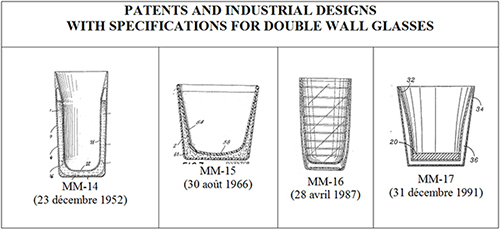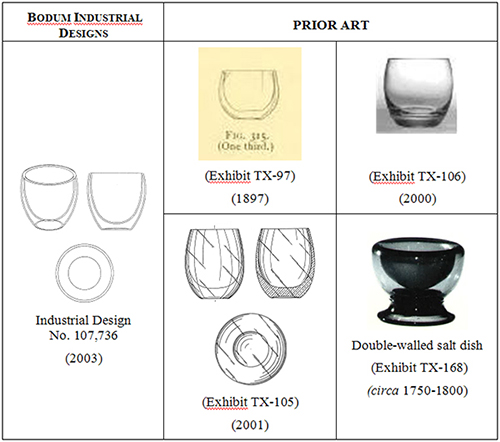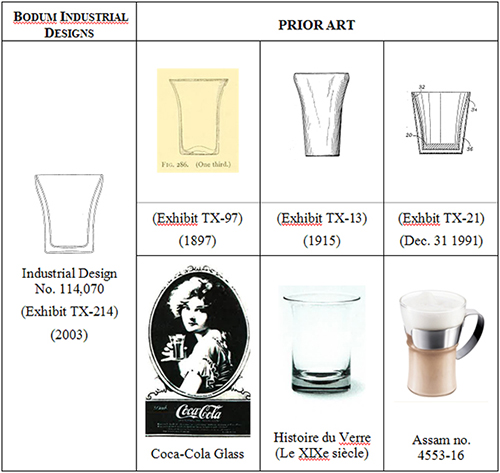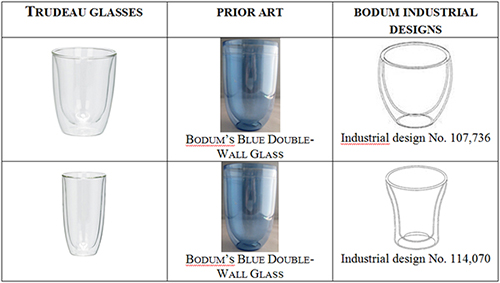Summary. On September 26, 2012, the Federal Court of Canada issued its decision in Bodum USA Inc and PI Design AG v Trudeau Corporation (1889) Inc, 2012 FC 1128, the first industrial design infringement decision on the merits emanating from any level of the Federal Court since a 1993 amendment to the infringement provisions of the Industrial Design Act (“Act”).
In its decision, the Court rejected Bodum USA and PI Design AG (“Bodum”)’s claim of industrial design infringement against Trudeau Corporation (1889) Inc. (“Trudeau”) and declared Bodum’s Industrial Design Registration Nos. 107,736 and 114,070 covering the configuration of double-wall drinking glasses invalid. The Court also dismissed Bodum’s passing off claim as it was not argued during trial. Trudeau was awarded its costs in the action.
This decision is notable namely in its clarification of principles applicable to the delimitation of the scope of industrial design protection, the test for infringement, and the originality standard for the validity of industrial design registrations.
Trudeau was successfully represented by François Guay and Ekaterina Tsimberis of Smart & Biggar’s Montreal office.
Background. The plaintiffs, PI Design AG and Bodum USA, Inc., were the respective owner and licensee in Canada of Industrial Design Registrations Nos. 107,736 and 114,070 pertaining to the configuration of double-wall drinking glasses, reproduced below, and commercialized by Bodum in Canada in association with its Pavina and Assam lines of glasses since around 2003 and 2004.

The defendant, Trudeau, a family-owned Canadian company specializing in the design, manufacture and distribution of kitchenware and glassware, had been selling in Canada two versions of TRUDEAU branded double-wall drinking glasses since 2006. Those glasses, depicted below, were alleged to infringe the plaintiffs’ industrial designs, though the plaintiffs never made clear which glass allegedly infringed which design.

Judgment of the Federal Court. In respect of the infringement claim, the Court found that the industrial designs in question should be afforded a very limited scope of protection and that Trudeau’s double-wall glasses were too different for a finding of infringement. The Court also found that Bodum’s industrial designs were not sufficiently original to warrant protection, consequently invalidating both registrations.
Infringement. In its preliminary remarks, the Court was careful in noting the distinction between the functional and visual characteristics of the designs and glasses at issue. Indeed, as industrial design registrations only protect the visual aspects of a design, and because the double-wall aspect of Bodum’s glasses was functional (i.e., to keep hot drinks hot and cold drinks cold) and such functionality was admitted by the plaintiffs, the Court ignored that aspect in its infringement analysis.
The scope of protection of Bodum’s design was further limited by the fact that they claimed “the visual features of the entirety of the drinking glass shown in the drawings (emphasis added)". In applying Sommer Allibert (UK) Limited and Another v. Flair Plastics Limited, [1987] 25 RPC 599 at page 626 (UK ChD, appeal), the Court noted that for a finding of infringement to arise in such cases the allegedly infringing articles must be almost identical to the designs. Moreover, the prior art referred to by the expert witness, which was strikingly similar to the alleged industrial designs, was taken into account in narrowing the scope of protection.



The parties were in disagreement as to the legal test to apply in the infringement analysis for comparing the industrial designs and the Trudeau glasses. The plaintiff asserted that it is the way the consumer would see them and by applying the three-part test developed in British jurisprudence that refers to the doctrine of “imperfect recollection,” which it argued was still applicable in Canada. The defendant argued that the test should be carried out from the point of view of how the aware or informed consumer would see things and that a 1993 amendment to section 11 of the Act modified the test for infringement because the British test had also evolved following a similar amendment in the UK. The Court, while refraining from ruling on the applicability of the three-part test following the 1993 amendment, did mention that its relevance was questionable under the new infringement provisions of the Act that had replaced the element of “fraudulent imitation” with the concept of “design not differing substantially.” The Court thus applied the test put forth by the defendant, namely that whether the allegedly infringing article “differed substantially” from the registered design was to be assessed by the Court through the eyes of the “informed consumer.”
Turning to the visual characteristics of the designs and glasses at issue — including the concavity and convexity of their inside and outside lines of the glass walls — and considering the narrow protection afforded to Bodum’s designs, the Court held that the Trudeau glasses were a lot more similar to some pre-2003 glasses, including a blue double-wall glass commercialized by Bodum in 1991 depicted hereinafter, rather than to the industrial designs in question. In so finding, the Court concluded that the Trudeau glasses differed substantially from the alleged designs.

Invalidity. As regards the defendant’s counterclaim attacking the validity of the plaintiff’s designs, the Court confirmed that the presumption of validity afforded by registration could be rebutted by a finding that the designs are not substantially different from the prior art. In other words, if a design does not show a “spark of inspiration,” it will be declared invalid. Relying on the prior art referred to by the expert and on his testimony that because glassware has existed for a long time the majority of possible shapes has already been explored, the Court concluded that the designs were not sufficiently different from the relevant prior art that was in evidence — some of which dated back to the 18th century — to be afforded industrial design protection. The Court declared that both registrations were invalid and must be expunged from the Register.
Ultimately, the Federal Court:
- dismissed Bodum’s industrial design infringement claim;
- granted Trudeau’s counterclaim;
- declared invalid the Industrial Design Registrations Nos. 107,736 and 114,070;
- ordered the Commissioner of Patents to expunge Industrial Design Registrations Nos. 107,736 and 114,070 from the Register; and
- awarded costs to Trudeau.
On October 25, 2012, Bodum filed a Notice of Appeal to the Federal Court of Appeal under Court file No. A-450-12.
The preceding is intended as a timely update on Canadian intellectual property and technology law. The content is informational only and does not constitute legal or professional advice. To obtain such advice, please communicate with our offices directly.
